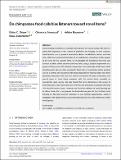Files in this item
Do chimpanzee food calls bias listeners toward novel items?
Item metadata
| dc.contributor.author | Déaux, Eloïse C | |
| dc.contributor.author | Bonneaud, Clémence | |
| dc.contributor.author | Baumeyer, Adrian | |
| dc.contributor.author | Zuberbühler, Klaus | |
| dc.date.accessioned | 2023-05-04T10:30:03Z | |
| dc.date.available | 2023-05-04T10:30:03Z | |
| dc.date.issued | 2023-07-01 | |
| dc.identifier | 285386790 | |
| dc.identifier | 5dc19a48-b680-4e1f-a598-99ad779584d5 | |
| dc.identifier | 37113057 | |
| dc.identifier | 85156274545 | |
| dc.identifier.citation | Déaux , E C , Bonneaud , C , Baumeyer , A & Zuberbühler , K 2023 , ' Do chimpanzee food calls bias listeners toward novel items? ' , American Journal of Primatology , vol. 85 , no. 7 , e23498 . https://doi.org/10.1002/ajp.23498 | en |
| dc.identifier.issn | 0275-2565 | |
| dc.identifier.other | ORCID: /0000-0001-8378-088X/work/134491007 | |
| dc.identifier.uri | https://hdl.handle.net/10023/27509 | |
| dc.description | Funding: The study was funded by the National Swiss Foundation grant number: SNF 31003A_166458 and the NCCR Evolving Language, Swiss National Science Foundation Agreement #51NF40_180888. | en |
| dc.description.abstract | Social learning is beneficial in almost every domain of a social animal's life, but it is particularly important in the context of predation and foraging. In both contexts, social animals tend to produce acoustically distinct vocalizations, alarms, and food calls, which have remained somewhat of an evolutionary conundrum as they appear to be costly for the signaller. Here, we investigated the hypothesis that food calls function to direct others toward novel food items, using a playback experiment on a group of chimpanzees. We showed chimpanzees novel (plausibly edible) items while simultaneously playing either conspecific food calls or acoustically similar greeting calls as a control. We found that individuals responded by staying longer near items previously associated with food calls even in the absence of these vocalizations, and peered more at these items compared with the control items, provided no conspecifics were nearby. We also found that once chimpanzees had access to both item types, they interacted more with the one previously associated with food calls than the control items. However, we found no evidence of social learning per se. Given these effects, we propose that food calls may gate and thus facilitate social learning by directing listeners' attention to new feeding opportunities, which if integrated with additional cues could ultimately lead to new food preferences within social groups. | |
| dc.format.extent | 12 | |
| dc.format.extent | 1275192 | |
| dc.language.iso | eng | |
| dc.relation.ispartof | American Journal of Primatology | en |
| dc.subject | Ape | en |
| dc.subject | Foraging | en |
| dc.subject | Social facilitation hypothesis | en |
| dc.subject | Social learning | en |
| dc.subject | Vocalization | en |
| dc.subject | DAS | en |
| dc.subject | MCC | en |
| dc.title | Do chimpanzee food calls bias listeners toward novel items? | en |
| dc.type | Journal article | en |
| dc.contributor.institution | University of St Andrews. School of Psychology and Neuroscience | en |
| dc.contributor.institution | University of St Andrews. Institute of Behavioural and Neural Sciences | en |
| dc.contributor.institution | University of St Andrews. Centre for Social Learning & Cognitive Evolution | en |
| dc.identifier.doi | https://doi.org/10.1002/ajp.23498 | |
| dc.description.status | Peer reviewed | en |
This item appears in the following Collection(s)
Items in the St Andrews Research Repository are protected by copyright, with all rights reserved, unless otherwise indicated.

